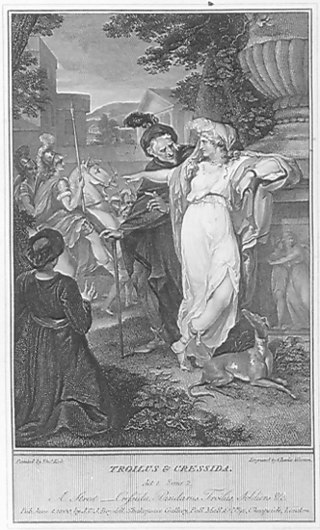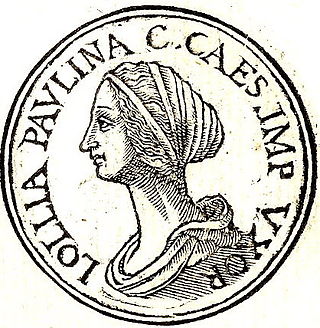Related Research Articles

Quintus Horatius Flaccus, commonly known in the English-speaking world as Horace, was the leading Roman lyric poet during the time of Augustus. The rhetorician Quintilian regarded his Odes as just about the only Latin lyrics worth reading: "He can be lofty sometimes, yet he is also full of charm and grace, versatile in his figures, and felicitously daring in his choice of words."

Tisiphone, or Tilphousia, was one of the three Erinyes or Furies. Her sisters were Alecto and Megaera. She and her sisters punished crimes of murder: parricide, fratricide and homicide.

Pandarus or Pandar is a Trojan aristocrat who appears in stories about the Trojan War.

Gaius Caesar was a grandson and heir to the throne of Roman emperor Augustus, alongside his younger brother Lucius Caesar. Although he was born to Marcus Vipsanius Agrippa and Julia, Augustus' only daughter, Gaius and Lucius were raised by their grandfather as his adopted sons and joint-heirs. He experienced an accelerated political career befitting a member of the Julio-Claudian dynasty, with the Roman Senate allowing him to advance his career without first holding a quaestorship or praetorship, offices that ordinary senators were required to hold as part of the cursus honorum.
According to the medieval poet Jean Bodel, the Matter of Rome is the literary cycle of Greek and Roman mythology, together with episodes from the history of classical antiquity, focusing on military heroes like Alexander the Great and Julius Caesar. Bodel's division of literary cycles also included the Matter of France and the Matter of Britain. The Matter of Rome includes the Matter of Troy, consisting of romances and other texts based on the Trojan War and its legacy, including the adventures of Aeneas.
The Carmen saeculare is a Latin hymn written by Horace and commissioned by Augustus. It was sung by a choir of girls and boys at the secular games in 17 BC. It is written in Sapphic meter and follows the themes of the poets of the day, in particular Vergil.

Cressida is a character who appears in many Medieval and Renaissance retellings of the story of the Trojan War. She is a Trojan woman, the daughter of Chryses, a Trojan priest. She falls in love with Troilus, the youngest son of King Priam, and pledges everlasting love, but when she is sent to the Greeks as part of a hostage exchange, she forms a liaison with the Greek warrior Diomedes. In later culture she becomes an archetype of a faithless lover.

Troilus and Criseyde is an epic poem by Geoffrey Chaucer which re-tells in Middle English the tragic story of the lovers Troilus and Criseyde set against a backdrop of war during the siege of Troy. It was written in rime royale and probably completed during the mid-1380s. Many Chaucer scholars regard it as the poet's finest work. As a finished long poem, it is more self-contained than the better known but ultimately unfinished The Canterbury Tales. This poem is often considered the source of the phrase: "all good things must come to an end" (3.615).

Lollia Paulina was a Roman empress for six months in 38 as the third wife of the Roman emperor Caligula.

Troilus is a legendary character associated with the story of the Trojan War. The first surviving reference to him is in Homer's Iliad, composed in the late 8th century BCE.
Ripheus was a Trojan hero and the name of a figure from the Aeneid of Virgil. A comrade of Aeneas, he was a Trojan who was killed defending his city against the Greeks. "Ripheus also fell," Virgil writes, "uniquely the most just of all the Trojans, the most faithful preserver of equity; but the gods decided otherwise". Ripheus's righteousness was not rewarded by the gods.

The Epistles of Horace were published in two books, in 20 BC and 14 BC, respectively.
Marcus Lollius was a Roman politician, military officer and supporter of the first Roman emperor Augustus. His granddaughter Lollia Paulina would marry the emperor's great-grandson Caligula and become empress.

"Il Filostrato" is a poem by the Italian writer Giovanni Boccaccio, and the inspiration for Geoffrey Chaucer's Troilus and Criseyde and, through Chaucer, the Shakespeare play Troilus and Cressida. It is itself loosely based on Le Roman de Troie, by 12th-century poet Benoît de Sainte-Maure.

Le Roman de Troie by Benoît de Sainte-Maure, probably written between 1155 and 1160, is a 30,000-line epic poem, a medieval retelling of the theme of the Trojan War. It inspired a body of literature in the genre called the roman antique, loosely assembled by the poet Jean Bodel as the Matter of Rome. The Trojan subject itself, for which de Sainte-Maure provided an impetus, is referred to as the Matter of Troy.

The Satires is a collection of satirical poems written in Latin dactylic hexameters by the Roman poet Horace. Published probably in 35 BC and at the latest, by 33 BC, the first book of Satires represents Horace's first published work. It established him as one of the great poetic talents of the Augustan Age. The second book was published in 30 BC as a sequel.
Lollius Bassus is the author of ten epigrams in the Greek Anthology. He is called, in the title of the second epigram, a native of Smyrna. His time is fixed by the tenth epigram, on the death of Germanicus, who died in 19 AD. He is perhaps the same Lollius to whom Horace wrote an Ode. It is also possible that he is the Lollius referred to by Chaucer. Lollius is the origin for Chaucer's story of Troilus.

The gens Lollia was a plebeian family at Rome. Members of the gens do not appear at Rome until the last century of the Republic. The first of the family to obtain the consulship was Marcus Lollius, in 21 BC.
Marcus Lollius was a Roman Senator who was active in the second half of 1st century BC and first half of 1st century. He is best remembered as the father of empress Lollia Paulina.
Lollia Saturnina (c.10-41) was a Roman noble woman who lived in the Roman Empire in the 1st century. She was the sister of the Roman empress Lollia Paulina and was a mistress of the Roman emperor Caligula.
References
- 1 2 3 Ferry, The Epistles of Horace Book I, p. xxi
- 1 2 3 4 5 Chaucer, Troilus and Criseyde: A New Translation, p. xvii
- 1 2 3 4 5 Harrison, Homage to Horace: A Bimillenary Celebration, p. 290
- ↑ "Lollia Gens", A Dictionary of Greek and Roman biography and mythology, William Smith, editor. (1870) Perseus Project
- 1 2 3 4 Horace, Horace: Epistles Book I, p. 79
- 1 2 3 "Lollius (5)", A Dictionary of Greek and Roman biography and mythology, William Smith, editor. (1870) Perseus Project
- 1 2 3 4 5 6 7 8 Highet, The Classical Tradition: Greek and Roman Influences on Western Literature, p. 96
- ↑ Horace, The Satires of Horace and Persius
- 1 2 Harrison, Homage to Horace: A Bimillenary Celebration, p. 291
- ↑ Harrison, Homage to Horace: A Bimillenary Celebration, p. 293
- 1 2 Horace, Horace: Epistles Book I, p. 136
- ↑ Highet, The Classical Tradition: Greek and Roman Influences on Western Literature, p. 97